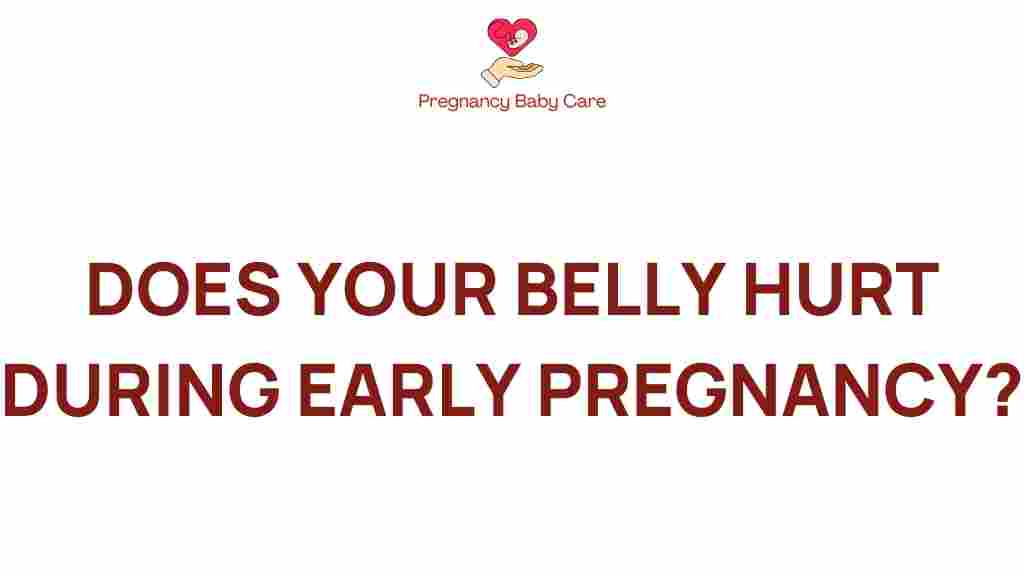Unraveling the Mystery: Why Does Your Belly Hurt in Early Pregnancy?
Early pregnancy can be an exciting yet confusing time for expectant mothers. One common symptom that many women experience is belly pain, which can lead to concerns about the health of both the mother and the developing fetus. In this article, we will explore the various reasons why you might experience discomfort in your belly during early pregnancy, what is considered normal, and when to seek help. Understanding these aspects can alleviate fears and provide clarity during this crucial time.
Understanding Early Pregnancy
Early pregnancy is typically defined as the first trimester, which spans from conception until the end of the 12th week. During this phase, your body undergoes significant hormonal and physical changes as it prepares to support a new life. While many women may feel excited about the changes, they can also encounter various pregnancy symptoms, including:
- Nausea and vomiting
- Fatigue
- Frequent urination
- Belly pain or cramping
- Breast tenderness
Belly pain in early pregnancy can range from mild discomfort to more severe cramping, and understanding these sensations is crucial for expectant mothers.
Common Causes of Belly Pain in Early Pregnancy
There are several reasons why you may experience belly pain during early pregnancy. Here are some of the most common causes:
1. Implantation Pain
One of the earliest signs of pregnancy is implantation, which occurs when the fertilized egg attaches itself to the lining of the uterus. This can cause mild cramping or discomfort, often referred to as implantation pain. While this discomfort is usually brief, it can be alarming for some women.
2. Uterine Growth
As your pregnancy progresses, your uterus begins to expand to accommodate the growing fetus. This stretching can lead to a sensation of tightness or mild cramping in the lower abdomen, which is generally normal and part of the body’s adaptation to pregnancy.
3. Hormonal Changes
During early pregnancy, your body undergoes significant hormonal fluctuations. Hormones such as progesterone increase to support the pregnancy. These hormonal changes can lead to various symptoms, including abdominal discomfort and bloating.
4. Gas and Bloating
Increased progesterone can also slow down your digestive system, leading to gas and bloating. This can cause cramping and discomfort in the belly, which is often mistaken for more serious issues.
5. Round Ligament Pain
As your pregnancy progresses, the round ligaments that support the uterus can stretch, causing sharp or stabbing pains, particularly in the lower abdomen. Although this type of pain can be uncomfortable, it is usually harmless and a normal part of pregnancy.
6. Ectopic Pregnancy
While most belly pain in early pregnancy is normal, it’s important to be aware that sometimes pain can signal a problem, such as an ectopic pregnancy. This condition occurs when a fertilized egg implants outside the uterus, typically in a fallopian tube. Symptoms may include severe abdominal pain, vaginal bleeding, and shoulder pain. If you experience these symptoms, seek medical attention immediately.
7. Miscarriage
Another serious cause of belly pain in early pregnancy can be a miscarriage. Symptoms may include cramping, lower back pain, and heavy bleeding. If you suspect a miscarriage, it’s crucial to contact your healthcare provider for guidance and support.
When to Seek Medical Attention
While some belly pain in early pregnancy is normal, there are specific situations where you should seek medical attention:
- Severe abdominal pain that does not go away
- Heavy bleeding or clotting
- Dizziness or fainting
- Persistent nausea or vomiting
- Signs of infection, such as fever or chills
Always trust your instincts. If something feels off, it’s better to err on the side of caution and consult your healthcare provider.
Managing Belly Pain in Early Pregnancy
Here are some tips for managing discomfort in your belly during early pregnancy:
1. Rest and Relaxation
Finding time to rest and relax can help alleviate discomfort. Stress can exacerbate pain, so engage in calming activities like reading, meditation, or gentle yoga.
2. Stay Hydrated
Drinking plenty of water can help with digestion and reduce bloating, which may lessen belly pain. Aim for at least 8-10 glasses of water per day.
3. Eat Smaller, Frequent Meals
Instead of three large meals a day, try eating smaller, more frequent meals to help manage gas and bloating.
4. Avoid Trigger Foods
Identify any foods that may trigger gas or discomfort, such as beans, carbonated drinks, and fried foods, and try to limit their intake.
5. Gentle Exercise
Engaging in gentle exercises such as walking or swimming can help improve circulation and reduce discomfort.
6. Use Heat Therapy
A warm compress or heating pad on your abdomen can provide relief from cramping and discomfort. Just be sure to keep it at a low temperature.
Importance of Prenatal Care
Regular prenatal care is crucial for the health of both you and your baby during early pregnancy. Your healthcare provider will monitor your progress and address any concerns you may have regarding belly pain or other pregnancy symptoms. Attending regular appointments ensures that any potential issues are caught early and managed effectively.
For more information about prenatal care, you can visit the American Pregnancy Association.
Conclusion
Belly pain in early pregnancy is a common experience for many expectant mothers, caused by various factors including hormonal changes, uterine growth, and gas. While most discomforts are normal and manageable, it’s essential to remain vigilant and aware of your body’s signals. Always consult your healthcare provider if you have concerns or experience unusual symptoms. Remember, taking care of your health is paramount during this precious time, and regular prenatal care is key to a healthy pregnancy journey.
With the right information and support, you can navigate the challenges of early pregnancy with confidence and peace of mind.
This article is in the category Pregnancy and created by PregnancyBabyCare Team
